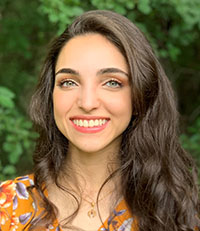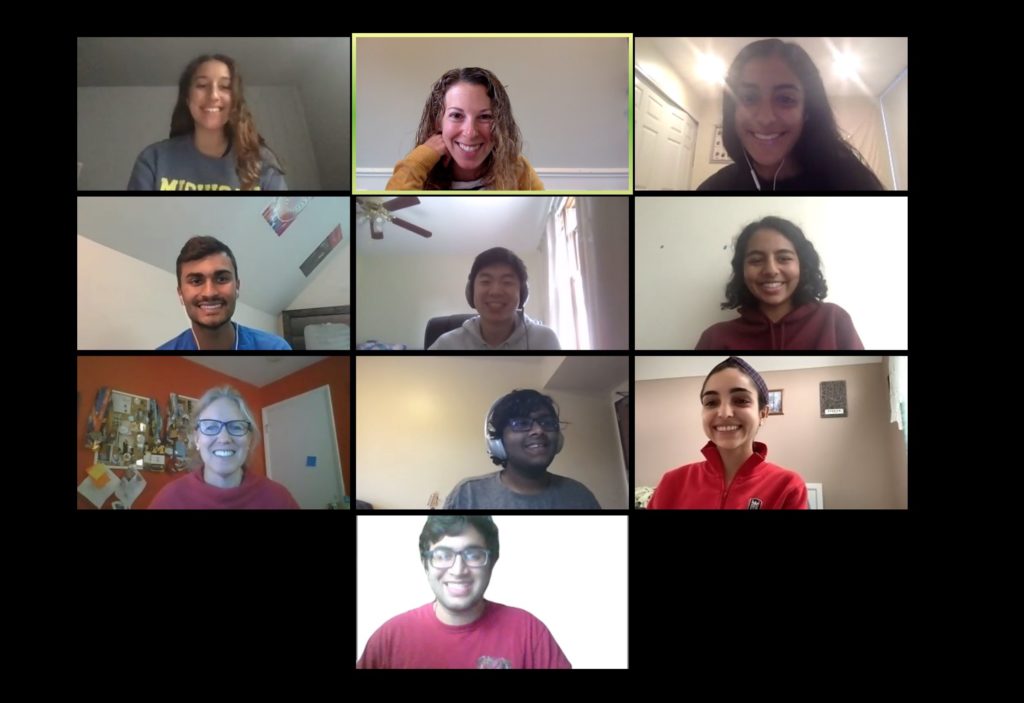
As I reflect on the first year of my Ph.D., I’m amazed at how much I’ve grown, both academically and personally. I embarked on this journey during a global crisis, and as the COVID-19 pandemic made my worries a reality, I quickly had to learn how to adjust. I was expecting to move to Ann Arbor, to attend my courses in a classroom, and to collaborate with my colleagues and advisors in-person. I’d been dreaming of the day I’d start at U of M for years, and not being able to have the “normal” start I was expecting was disappointing, to say the least. However, as is usually the case with tough times, there is a light at the end of the tunnel. As I excitedly prepare to move to Ann Arbor to start my second year, I want to highlight a few lessons from my first year that mean the most to me.
1. Find your people.
The first year of any graduate program is expected to be difficult, and we often hear that having a solid support system is key in making the transition go smoothly. An online environment clearly presents its own unique challenges, but luckily, I was (virtually) in the right place. CHEPS and IOE have been the perfect places to not only learn how to be a great researcher but also places where I have found an amazing support system that has lifted me up when I’ve needed it most. When I frustratingly spent hours stuck on a single homework problem or research idea, Dr. Cohn and Dr. Jiang’s wise advice and encouragements quickly put things into perspective. When I needed help understanding pieces of our simulation model on the CHEPS Prenatal team, my team members were more than willing to lend a helping hand. When nothing seemed to be going right, and I felt overwhelmed, my new friends set up virtual game nights and offered uplifting words. What I learned through all of this is that we are not meant to work (or do this whole life thing, in general) in isolation – the people we surround ourselves with truly shape our experiences.

2. Perfection is not possible, but your best is good enough.
I’ve always struggled with this idea that everything I do has to be perfect – I need to score 100% on all my exams, I need to rewrite my homework so that it’s immaculate and free of errors before submitting, and so on. This year, I very quickly realized that sometimes, no matter how hard we try, perfection is not possible. When faced with numerous assignments, all with upcoming deadlines, it’s physically impossible to complete everything flawlessly. I learned to “optimize” my time – I set aside a reasonable amount of time for each task, gave my best effort during that time window, and did not allow myself to think about the task outside of that window. I found that I was more productive, and while my deliverables weren’t absolutely perfect, they were more than good enough.
Perhaps an even more important takeaway is that not only is perfection not possible, but that struggle (and even failure) is okay. As I was challenged by my coursework and research, I began to realize that the expectation isn’t that I should already be an expert – otherwise, I’d already have my Ph.D. Rather, the expectation is that I am continuously learning, and what better way to learn something than to struggle, try again, struggle some more, and then finally grasp it? I’m certain that many more challenges are ahead, but I’m comfortable in the knowledge that as long as I maintain my desire and passion for learning, I will be okay.
3. Celebrate the small wins.
In graduate school, or research, there are inevitably many setbacks – but there are also many more accomplishments. They can range from publishing your work or acing an exam, to things as small as receiving a “good job!” from a colleague or crossing a task off your to-do list. This year, I found that as my workload got heavier, things became overwhelming. Something that helped me immensely was consciously doing something to “reward” myself for completing tasks. A couple of newfound traditions have emerged from this: after I cross off the last thing on my list for the day, I read for fun for an hour, and unless I have pressing deadlines, I celebrate my progress for that week by taking Friday afternoons off and grabbing coffee with my little sister. These small daily/weekly celebrations help me maintain perspective – that I’m working hard towards my goals, which is worth celebrating – and more generally, help keep me sane. The road we’re traveling isn’t an easy one, so for our own sakes, we should celebrate each and every win, no matter how small.
Ultimately, my first year taught me resiliency, helped me focus on my passions, and perhaps most importantly, taught me to prioritize my own wellbeing. As I begin my second year at IOE and CHEPS, I look forward to continued growth and learning, surrounded by colleagues and mentors who motivate and inspire me.
